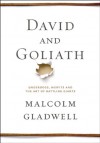Currently reading
David and Goliath: Underdogs, Misfits, and the Art of Battling Giants
The Speed of Dark
Battle Royale
Marianne Dreams
Coming to Our Senses: Healing Ourselves and the World Through Mindfulness
 Saw a friend's review of this book and decided to give it a try. It fits the categories of historical sports fiction, so I might have found it anyways. Either way, I'm glad I read it.
Saw a friend's review of this book and decided to give it a try. It fits the categories of historical sports fiction, so I might have found it anyways. Either way, I'm glad I read it.The author gives complete and evolving descriptions of a town and the inhabitants - every few chapters, a new wrinkle appears in a by now familiar face. A lot of these people started the book downtrodden, branded as "losers" by life or circumstances, or more directly by other basketball teams. This book about casting off those shackles, told through a narrative that I found hard to put down. Definitely recommended.
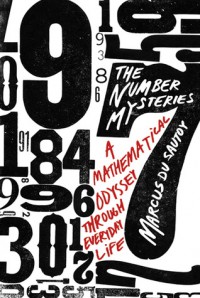 Similar to another recent book ([b:Nine Algorithms That Changed the Future: The Ingenious Ideas That Drive Today's Computers|12413727|Nine Algorithms That Changed the Future The Ingenious Ideas That Drive Today's Computers|John MacCormick|https://d202m5krfqbpi5.cloudfront.net/books/1356090041s/12413727.jpg|17395460]), this book focuses on the four of the six unsolved mathematical Millennium Prize Problems, with one chapter per. Variations and discussions of the math and importance of these problems is very accessible to the average reader. The illustrations help illustrate the concepts and shapes discussed. A fifth chapter describes the Poincaré conjecture, only mentioning Grigori Perelman's proof at the end without seriously delving into it.
Similar to another recent book ([b:Nine Algorithms That Changed the Future: The Ingenious Ideas That Drive Today's Computers|12413727|Nine Algorithms That Changed the Future The Ingenious Ideas That Drive Today's Computers|John MacCormick|https://d202m5krfqbpi5.cloudfront.net/books/1356090041s/12413727.jpg|17395460]), this book focuses on the four of the six unsolved mathematical Millennium Prize Problems, with one chapter per. Variations and discussions of the math and importance of these problems is very accessible to the average reader. The illustrations help illustrate the concepts and shapes discussed. A fifth chapter describes the Poincaré conjecture, only mentioning Grigori Perelman's proof at the end without seriously delving into it.
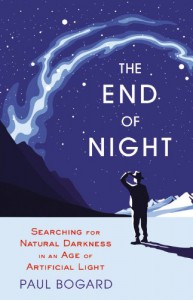 With chapters counting down the Bortle scale (9 to 1), this book examines levels of darkness in the world. Chapters discuss modern fallacies (light reduces crime!) and the real reasons (adding light is an easy win for politicians; utilities need to sell electricity at night). Some very good discussions of night in earlier cultures, some rambling travels with a lot of bad weather. Enjoyed the discussions from each chapter at the end, and plan to find a Bortle 1 class night next summer. Somewhere between 3.5 and 4 stars.
With chapters counting down the Bortle scale (9 to 1), this book examines levels of darkness in the world. Chapters discuss modern fallacies (light reduces crime!) and the real reasons (adding light is an easy win for politicians; utilities need to sell electricity at night). Some very good discussions of night in earlier cultures, some rambling travels with a lot of bad weather. Enjoyed the discussions from each chapter at the end, and plan to find a Bortle 1 class night next summer. Somewhere between 3.5 and 4 stars.
 Tried reading this with my daughter (9) who couldn't get into it. Finished it on my own; a better target may be young teens. In the book, the author tells a story of his father's diary, recorded while lost in Tibet. These events are connected to stories told to the author while sick in bed, and both events and stories have a dreamlike quality. Color is used to separate the stories and the illustrations as well, and the final pictures have many glorious colors.
Tried reading this with my daughter (9) who couldn't get into it. Finished it on my own; a better target may be young teens. In the book, the author tells a story of his father's diary, recorded while lost in Tibet. These events are connected to stories told to the author while sick in bed, and both events and stories have a dreamlike quality. Color is used to separate the stories and the illustrations as well, and the final pictures have many glorious colors.
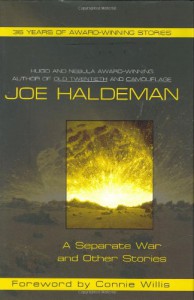 I sought this one out because of the first story, closely connected to the Forever War, which was okay. Most of the rest were better than average.
I sought this one out because of the first story, closely connected to the Forever War, which was okay. Most of the rest were better than average.
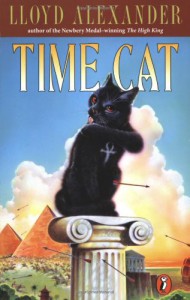 Much interrupted, this was a very enjoyable childrens book. Quite a bit of fun to read aloud - an opportunity to use German, Irish, Asian, Egyptian, and even early American voices. Daughter and I will seek out other Lloyd Alexander titles to read, and I plan to read the famous Prydain series soon.
Much interrupted, this was a very enjoyable childrens book. Quite a bit of fun to read aloud - an opportunity to use German, Irish, Asian, Egyptian, and even early American voices. Daughter and I will seek out other Lloyd Alexander titles to read, and I plan to read the famous Prydain series soon.
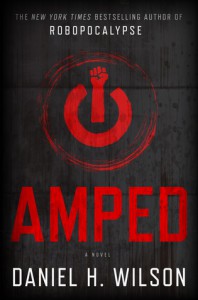 A good beginning and a situation that makes you think - what if people were given free license to discriminate against someone? Would they come out of the woodwork, happy to disrespect a human being legally? No, I don't think this is where the author was going, but it made me think. Then things devolved into cartoon violence. Certain aspects were unbelievable, and others were inevitable. The main character's primary aspect is that he's good - at least if he reminds himself that he is. I more or less liked the ending - just the middle parts that needed some work.
A good beginning and a situation that makes you think - what if people were given free license to discriminate against someone? Would they come out of the woodwork, happy to disrespect a human being legally? No, I don't think this is where the author was going, but it made me think. Then things devolved into cartoon violence. Certain aspects were unbelievable, and others were inevitable. The main character's primary aspect is that he's good - at least if he reminds himself that he is. I more or less liked the ending - just the middle parts that needed some work.
Healing the Angry Brain: How Understanding the Way Your Brain Works Can Help You Control Anger and Aggression
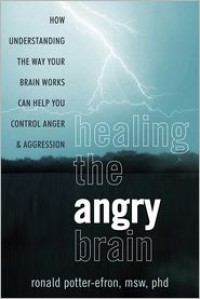 A good book, perhaps too focused on the brain-level functions of anger. The message that you can change your brain is great, and there are some good strategies in the latter half of the book. I think we could all stand to improve our empathy and empathic concern.
A good book, perhaps too focused on the brain-level functions of anger. The message that you can change your brain is great, and there are some good strategies in the latter half of the book. I think we could all stand to improve our empathy and empathic concern.Originally picked this up to read with my son, but the medical bits got to be too much. Came back to it in September; this is really a fairly quick read.
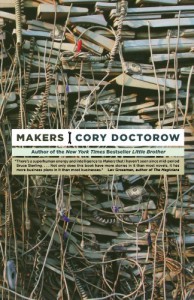 I found myself comparing this to William Gibson's Blue Ant series, mostly unfavorably (from me, that series netted only 3 stars). This book was rambling and long, with mostly unconnected sections. It was originally serialized on Tor's website, and perhaps it was written with that in mind. I enjoyed the character of Suzanne Church (even if she was mostly 2D) and the epilog, which was really excellent. The idea of Makers was also interesting, but didn't feel well thought out. Bringing Disney in half-way through felt very forced. I'll look for other books by Cory Doctorow, but after a break.
I found myself comparing this to William Gibson's Blue Ant series, mostly unfavorably (from me, that series netted only 3 stars). This book was rambling and long, with mostly unconnected sections. It was originally serialized on Tor's website, and perhaps it was written with that in mind. I enjoyed the character of Suzanne Church (even if she was mostly 2D) and the epilog, which was really excellent. The idea of Makers was also interesting, but didn't feel well thought out. Bringing Disney in half-way through felt very forced. I'll look for other books by Cory Doctorow, but after a break.
 Right back on track, and finally bringing in the history! Still a heck of a lot of keys to keep straight, and just one more graphic novel (plus a few miscellaneous issues) to go.
Right back on track, and finally bringing in the history! Still a heck of a lot of keys to keep straight, and just one more graphic novel (plus a few miscellaneous issues) to go.
 Still a good book and a good series, but it felt much more random than the other books. Only the last few pages are a real dive back into the story... and a big cliffhanger for Vol. 5.
Still a good book and a good series, but it felt much more random than the other books. Only the last few pages are a real dive back into the story... and a big cliffhanger for Vol. 5.
 Between the stream-of-consciousness narration, the unlikeable characters and the inevitable ending that took forever to arrive, I just didn't like this book.
Between the stream-of-consciousness narration, the unlikeable characters and the inevitable ending that took forever to arrive, I just didn't like this book. The plot is this: Nicholas, a video store clerk finds a mysterious hole in an abandoned storage room. He shows it to Nakota, who wants to explore it - lowering items into it, and eventually a camcorder. She becomes obsessed with the resulting video and he with the hole itself.
The unexplained provides the horror here, but not to society or even the town - just to the main characters. Unlike them, I felt no obsession to this book, and finishing it was a chore. This would have been much better as a short story.
Author Kathe Koja is well known for young-adult books. This was her first novel, in the Horror genre. I read it as part of the Women of Genre Fiction reading challenge at Worlds Without End. It was nominated for the 1991 Philip K. Dick award.
 Really liked this reboot of the classic Little Fuzzy, though there was more John Grisham than Science Fiction. Solid plot carried the novel, which is good because the characters were fairly flat. May have read the original as a kid, definitely didn't read any of the many sequels.
Really liked this reboot of the classic Little Fuzzy, though there was more John Grisham than Science Fiction. Solid plot carried the novel, which is good because the characters were fairly flat. May have read the original as a kid, definitely didn't read any of the many sequels.
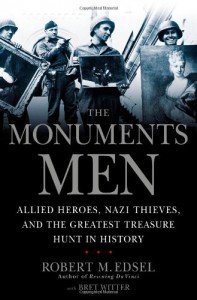 Picked this up to read before the movie. Result - this is a very good book. Just when it starts to slow, the story of Altaussee starts to build to an exciting finish - more so because I didn't know this story going in. The chapters are in general fairly short, except for the final "where are they now" chapter. Definitely looking forward to the film, and inspired to seek out Frankenheimer's The Train (based on a book by Rose Valland) and other supplementary materials. Recommended!
Picked this up to read before the movie. Result - this is a very good book. Just when it starts to slow, the story of Altaussee starts to build to an exciting finish - more so because I didn't know this story going in. The chapters are in general fairly short, except for the final "where are they now" chapter. Definitely looking forward to the film, and inspired to seek out Frankenheimer's The Train (based on a book by Rose Valland) and other supplementary materials. Recommended!
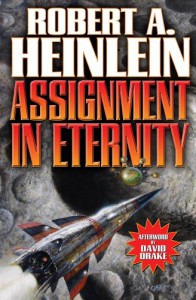 A fairly good set of four stories, or two novellas and two short stories. Read about Gulf in the afterword for Glory Road, and immediately sought it out (I plan to re-read Friday sometime soon). Enjoyed Lost Legacy quite a bit also.
A fairly good set of four stories, or two novellas and two short stories. Read about Gulf in the afterword for Glory Road, and immediately sought it out (I plan to re-read Friday sometime soon). Enjoyed Lost Legacy quite a bit also.
Every Day is an Atheist Holiday
 This book contains an excellent breakdown of the "I Have a Dream" speech and some good anecdotes. Not much improved from my first assessment, which was:
This book contains an excellent breakdown of the "I Have a Dream" speech and some good anecdotes. Not much improved from my first assessment, which was:Each chapter starts is labeled for a holiday, which has little or nothing to do with the rambling contents. Occasional bits of funny, but in general nowhere near as good as God No. Also, if I *never* hear Penn talk about Clay Aiken again, it will be too soon. Sheesh!
Overall rating - 2 star, "It was Ok".
